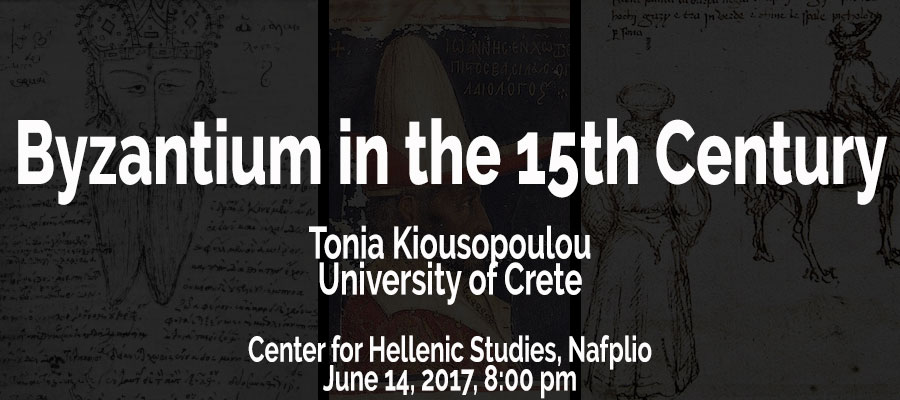Byzantium in the 15th Century, lecture by Tonia Kiousopoulou (University of Crete), Center for Hellenic Studies, Nafplio, June 14, 2017, 8:00 pm
In the 15th century and just before the fall of Constantinople by the Ottomans the Byzantium tended to be transformed into a city-state. The internal conflicts observed, with a major conflict between the pro- and anti-unionists, highlight the various perceptions which are shaped by the political issues of this period and reflect the various social groups’ plans for the present and future of the restricted territory of Byzantium.
Tonia Kiousopoulou is a professor of Byzantine History at the Department of History and Archeology of the University of Crete. She was born in Athens in 1958. She studied at the School of Philosophy of the University of Athens and completed her postgraduate studies at the Paris I-Pantheon-Sorbonne University. Her studies focus on the social history and historiography of Byzantium. Among other things, she has published the following books: a) The family institution in Epirus in the 13th century, Athens, A. Sakkoulas Publications, 1990, b) Time and ages in the Byzantine society. The age scale from the hagiological texts of the Middle Ages, Athens, Historical Archive of Greek Youth – Section of Neohellenic Research/NHRF, 1997, c) Emperor or Manager, Power and Political Ideology in Byzantium before 1453, in Greek, Athens, Polis Publications, 2007, and in English, transl. Paul Magdalino, La Pomme d’or, Geneva 2011 d) Invisible Byzantine cities in Greece (13th-15th century), Athens, Polis Publications, 2013. She has also edited the collective volumes: a) 1453: The fall of Constantinople and the transition from medieval to modern times, Crete, Heraklion 2005, b) Byzantine Cities, Prospects of research and new historiographical approaches (8th-15th century), School of Philosophy Publications, Rethymno 2012. Her articles have been published in scholarly journals and collective volumes.
